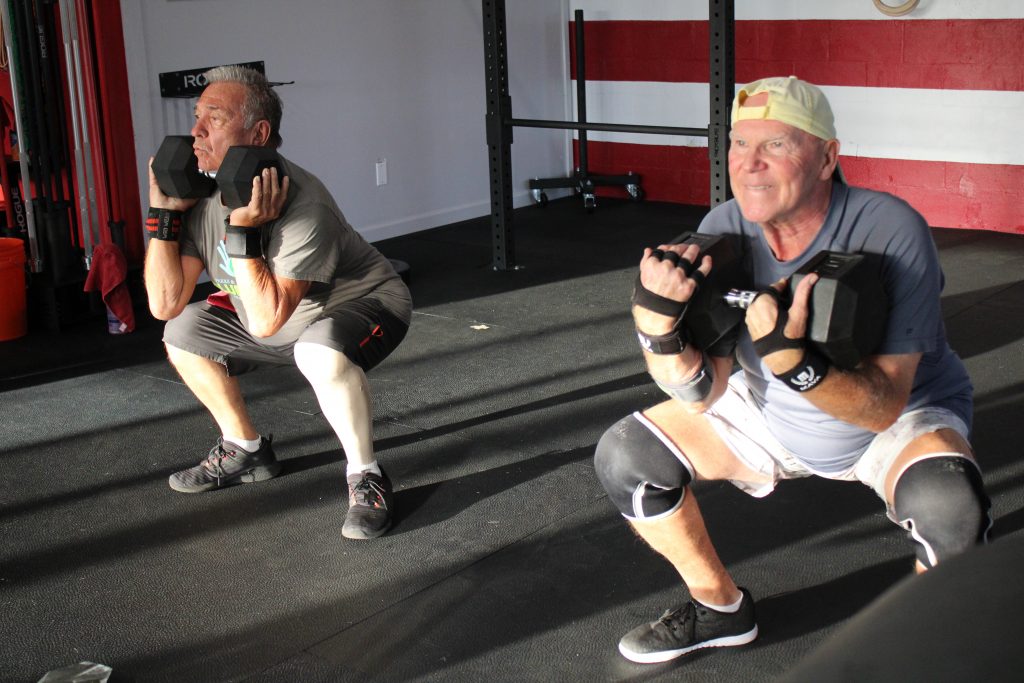
Regardless of age: As strong as you can get. Very strong. Stronger than yesterday. If you are getting “older” (over 40? or 50?) then the importance of this becomes greater.
Every time we post something like this it typically comes from an exchange we’ve had with our athletes. This is where experience matters…having had thousands of encounters with seniors age ranges 50 to 90’s, over almost 10 years (excluding Ed’s 30 years of clinical treatment time as a physical therapist) – it’s a lot of knowledge! For years now, we have watched new athletes in our gym(s) who’ve never exercised formally in their lives, develop movement skills and then layer on strength and capacity in those movements. What movements might you ask? The ability to pick objects up off of the ground (deadlift). The ability to get up from a chair, couch, toilet, or out of the car (squat). The ability to reach overhead for something, or put something on a high shelf in a closet or garage (press). Yes, everyday activities are exercises. And vice versa. So what’s the deal? What happens as you get older and these things get harder? Why? It’s because you’re absolute strength is waning. But contrary to what you might believe, it doesn’t have to. Losing strength, power, mobility, and endurance to a level it affects your daily life doesn’t have to happen – at least not to the extent you’re being led to believe.
Back to this topic having come from an exchange with an athlete. You know what happens: Doctor says “you shouldn’t lift heavy”, so you rationalize it as “I don’t need to be that strong”. Or, you suffer a calf pull doing shuttle runs or tweak your back on a deadlift. Yes, these things happen…and to the most warmed-up, athletic, and prepared people. It’s a fact of life, guys. How you manage the challenge is the key to your success. And putting that chip on your shoulder when you’re dealt a blow is the worst thing you can do. Lean into it. Mindset! Time off to heal a muscle pull in one area affords you the forced opportunity to work on another area you may have been neglecting, whether it’s flexibility or strength. Many times it helps us work on a unilateral movement which we all work too infrequently. Regardless of what it is, it happens. And you can persevere. And you should.
But why? Well, it’s not just a character builder. It’s also a lifesaver. Waaaaaaay back in 2003 (20 years ago!) in the Journal of Gerontology, a study was published indicating that older adults exert more effort than younger adults in their activities of daily living (like those listed above). Well, of course they do! But really think about that. Do we have to? (Now I use “we” because I’m one of those older people!). If you’re reading this you’re probably someone who exercises, and therefore you probably understand what a 1 rep max is. You know, that movement that we ask to you do one time at a load you could do once, successfully, but not twice. Well, imagine if everything you do in life is near that level of effort. I don’t know about you but when I 1 rep max a deadlift, I want to pass out afterward. It’s supposed to be hard. But living my life with that much effort? Think of this:
- Getting out of bed 1 rep max.
- Standing up from the bed 1 rep max.
- Walking all the way to the bathroom 1 rep max.
- Sitting down on the toilet 1 rep max.
- Standing up from the toilet 1 rep max.
- Walking to the kitchen 1 rep max.
- Filling the coffee pot with water and carrying it to the coffee maker 1 rep max.
- Reaching down into the cupboard for a filter 1 rep max…
I’m exhausted just thinking about it! And all we’ve done is get up, go to the bathroom, and started a pot of coffee!
Our point? Maintenance as a goal has no place in a fitness program for seniors. We need to be striving for “gains”…improvement…progress! There’s always something you can do better – whether it’s with a load/weight to get stronger, with range of motion to improve mobility, or with speed and power to enhance your capacity in life. Don’t settle. The more we do the more we can do. The more we want it the easier it will come. And you might even find some friends and socialization along the way!
Reference: Old adults perform activities of daily living near their maximal capabilities